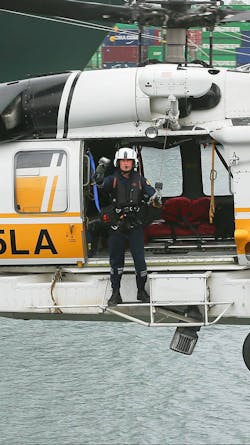Cancer Awareness & Prevention: Navigating Cancer
Like many in the fire service, I am fortunate to fulfill my appetite for the adrenaline we all crave—the ability to feed this hunger by responding to one person’s need in their time of urgency. I am a firefighter-paramedic with the Los Angeles County Fire Department. If that wasn’t enough of an adrenaline rush on its own, for the past 20-plus years, I’ve been assigned to one of the department’s $20 million Firehawk multi-mission helicopters.
Through years of experience and training, we as firefighters master a feeling of control. 9-1-1 is called, and the process begins: Information is gathered, the appropriate resources are dispatched, and we respond. Regardless of whether we’re career or volunteer, we hone our ability to calmly process the information, and we develop the utmost confidence that we will be able to successfully mitigate the situation. Knowing that we can extinguish the fire, extricate the patient from the wreckage, provide medical assistance that often means the difference between life and death—yes, life and death—we have the ultimate feeling of control.
We often carry that feeling of control into many other aspects of our life. And if you’re anything like me, you know how much of the “control freak” aspect of our personalities can take over. But how much do we really control and where does it end? I found out on Feb. 6, 2003, and I remember it like it was 10 minutes ago.
Three words change everything
After having some medical issues and visiting a doctor, I lost that feeling of control in a matter of seconds. Three small words suddenly left me with a feeling of complete disbelief. How could somebody who, as mentioned, has such “control” of his life feel so helpless in a few seconds? Nobody had ever prepared me for something like this. My education never covered it, my training never included it, my parents never spoke of it, and now I was left to understand that I was no longer in control. Every bit of confidence I had ever built in being able to be there for others on their worst days and abate their emergency—that ability to “control” a situation—was erased by the words, “You have cancer.”
I quickly had to take a crash course, “Cancer 101.” Many of those with whom I worked and shared my diagnosis, like me, had no experience with this or advice about what to do, where to go or where to turn. I was frustrated and found myself feeling alone on Cancer Island.
The situation turned worse when I was told during a doctor visit that my prognosis was one to three years to live. The cancer appeared to have spread to my liver. My confidence disappeared even further when the surgeon told me I should seek other opinions because she had little experience with the surgery I needed.
But then something changed. With cancer now introduced into my life, I learned how many firefighters from just my own department had been through this disease. Two of the most respected members of my department who you’d ever want to meet were cancer survivors. Rick Mallyon, a registered nurse and paramedic educator, had the exact type of cancer I had, and Fred Chavez, a member of my own unit, had fought an incredible battle with cancer and survived. They both immediately became my “Cancer Best Friends.” I learned lessons from them that you usually only gain from experience—experience no one ever wants.
Plan of attack
As my two families—my family at home and my family at work—rallied by my side, I placed my trust in the hands of two incredible people at USC Norris Cancer Hospital. Dr. Robert Beart, my surgeon, and Dr. Heinz Joseph Lenz, my oncologist. After many hours of debate about the best course of action, we decided on surgery on Feb. 23.
The staff at USC Norris was amazing. I wasn’t an easy patient to say the least. Dr. Beart’s nurse Yollee Casagrande has a heart filled with gold. After many trying days of recovery, I was able to go home.
This battle provided such ranges of emotion, from that feeling of having no control to anger to frustration to sadness. When Rick and Fred helped me deal with my own mortality, I suddenly realized how fragile I was, and at one point, weighing only 119 pounds, I felt like I was not going to win this battle; I felt like I was dying.
During my first visit back to Norris Cancer Hospital to see what my next step was going to be, I found another emotion. I don’t know if I can adequately describe in this limited space the feeling when Dr. Beart shared the results of my surgery and subsequent biopsy results. You can’t put it in any simpler terms than he did. I asked him if he saw the biopsy results. He turned and looked at me with all the confidence in the world—more confidence than I’ll ever know, as his experience includes operating on two sitting U.S. presidents—and he simply stated, “We got this.”
To say this had an impact on me and my life is an understatement. After a nine-month absence from work, I returned to full duty. I am the luckiest guy in the world. Maybe it isn’t just luck. Again, a feeling that’s difficult to describe, perhaps simply my new found title says it best: survivor.
Helping others navigate the course
If you’re a cancer survivor, you will probably agree that the worst time after diagnosis is knowing that you have cancer and not knowing what you’re going to do or your course of treatment. I called this period my “darkest hours.”
The impact of being in a position I never thought about or imagined drove me to do something. I wanted to give back, much like Fred and Rick did for me. I was fortunate to know these two, but now, realizing the degree of cancer in the fire service, I wondered what I could do for other firefighters who weren’t fortunate like me to surround themselves and get the support needed. As firefighters, we are good at providing assistance but sometimes not really that good at receiving it, especially from outside our tight-knit fire service family. With that in mind, my idea was to develop a program where firefighter cancer survivors could be available to other firefighters, providing assistance when you’re faced with a cancer diagnosis.
The concept formed legs and began to grow immediately. With the backing of my Local 1014 brothers, the Firefighter Cancer Support Network (FCSN) was born. There is nothing better than being able to communicate with somebody who has already experienced what you are about to navigate. Being able to stay focused and understand that you’re not alone on “Cancer Island.”
The FCSN is able to share newly diagnosed firefighters with important tips about how best to navigate their medical experiences. For example:
- Take a friend in addition to your family member(s) to doctor appointments to serve as note-taker, as they will be better able to focus during potentially emotional discussions;
- Stay organized and maintain copies of all test results;
- Seek other opinions from doctors and cancer survivors;
- Track the pros and cons about treatment options in an organized manner;
- Make decisions about treatment options based on the facts you gather during your doctor appointments and talking to cancer survivors;
- Once you make your decision, move forward, look ahead, keep your focus and don’t look back; and
- Allow your family and friends to help, even when you feel like you might be imposing, as they want to help, and allowing them to do so helps fill emotional gaps for everyone involved.
How do you help a firefighter in one of your firehouses who has been diagnosed? Although everyone will require a different approach, there are some simple ways brother and sister firefighters can help. For example:
- Set up drivers to transport the patient to and from doctor appointments;
- Help secure baby-sitting or similar help;
- Provide/cook meals for the family so they don’t have to worry about it;
- Send cards and letters in the mail.
- Consider setting up a specific method of communication (e.g., text/phone trees, social media) to share information, but only if this is OK with the patient, as it is vital to respect their wishes related to how much information they want to share;
- Handle yard work and other miscellaneous duties around the house, and make these visits positive and comforting; and
- Ask the patient whether they want to talk about cancer and if the answer is “yes,” listen closely.
For me, when I was facing one to three years to live, I wanted to know that my fire service family would take care of my family. This was invaluable information to me. And you have no idea how much it meant to me reading those cards and letters while I was in my “darkest hours.”
FCSN can help
The FCSN has grown throughout the United States, Canada and around the world. Our mission has evolved from providing assistance to all active and retired firefighters, including their families, to also promoting cultural changes in the fire service. Change is a difficult process, especially among firefighters. We need to arm ourselves with the best protections to reduce our degree of exposure to deadly carcinogens. These changes seem simple in theory, however, difficult at times in application. If these changes sound too difficult, perhaps remember what I shared about my darkest hours, when I learned that I had only one to three years to live. That meant not seeing my daughters grow up, not spending time with loved ones and leaving behind so much life yet to live. Change really isn’t that difficult when the result is so rewarding.
The FCSN has been on the forefront of promoting a culture change and providing assistance to those diagnosed, and I couldn’t be prouder of what I started, the volunteers who spend countless hours supporting a vision is a reward to myself, every cancer survivor, and those we have lost, like my Cancer Best Friend Rick Mallyon. I am proud of my titles, one a dream and one the result of a battle I never thought possible: Firefighter and Cancer Survivor.
I ask you to enlist in the many supporters of our mission, get involved and make a difference. The result in helping others is a feeling money cannot buy. Be proud of who you are and what you do. If you or someone you know needs assistance or if you’re looking for educational materials and would like to be a part of our family, please connect with the FCSN.
Sidebar: Firefighter Cancer Support Network
FirefighterCancerSupport.org
(866) 994-FCSN
@FCSNnational
About the Author

Michael Dubron
Michael Dubron is a 26-year career veteran with the Los Angeles County Fire Department, serving as a firefighter-paramedic crew chief in Air Operations. He was diagnosed with cancer at the age of 39. After a nine-month absence, Dubron returned to work and later established the Firefighter Cancer Support Network (FCSN), a program where firefighters and their families could get assistance and support after receiving a cancer diagnosis.
